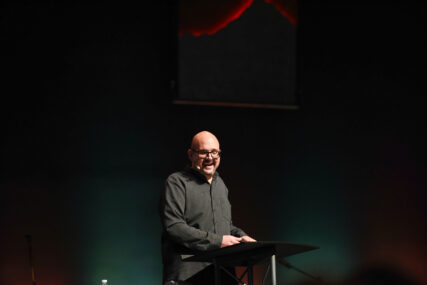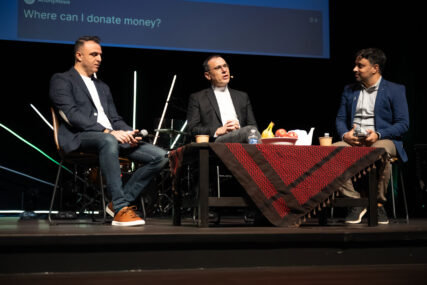Glen Ellyn, Ill. (RNS) — Earlier this year, Lydia El-Sayegh got the good news that her beloved grandmother was able to escape from Gaza.
While thankful her relative was no longer in a war zone, the news was bittersweet. “It’s a blessing and a tragedy,” said the 25-year-old El-Sayegh, sitting on a bench outside of Parkview Community Church in Chicago’s western suburbs on Friday (Sept. 12). “She should never have had to experience all that or had to leave her home in the first place.”
El-Sayegh was one of several Palestinians speaking at the Church at the Crossroads conference, a three-day event held at Parkview this week that aims to rally Christians to speak up for their fellow believers in Gaza.
The hope, organizers said, is to move American Christians from feeling bad about the war in Gaza to taking action to end it.
“We are at the crossroads,” Palestinian theologian Daniel Bannoura told some 800 attendees at the conference’s opening session on Thursday. “There’s a time right now for us to choose. Are we going to choose the path of peace or the path of violence?”
Several of the speakers expressed exasperation at Christians who express sympathy for the suffering in Gaza but offer little beyond thoughts and prayers in response.
Bannoura said that because America has supported Israel’s military operations in Gaza, being passive is not an option. “If you are not doing anything, you are doing something,” he said. “If you are in the U.S., then you are complicit.”
Gary Burge, a New Testament scholar and author of “Whose Land? Whose Promise,” rejected the notion espoused by Christian Zionists that the Bible requires Christians to support the modern-day state of Israel. That belief, common among evangelicals, has fueled much of the conservative Christian support for Israel.
“Modern Israel is not biblical Israel,” said Burge. “Let’s be clear.”

Anton Tony Deik speaks during the 2025 Church at the Crossroads event. Photo by Matt Mansueto/Church at the Crossroads
Anton “Tony” Deik, associate director of the Bethlehem Institute for Peace and Justice, which organized the conference, is a Palestinian Christian now living in Bolivia. He told conference attendees that linking current-day Israel to biblical history was “one of the greatest theological scandals,” meant to excuse the violence of the Nakba, or “catastrophe,” as Israeli militias drove Palestinians from their villages at the founding of the Jewish state.
But Deik was not interested in debates over Israel’s right to exist. Though he believes the founding of Israel was unjust, the fact is that Israel exists, he told RNS in an interview, “That’s just reality. The question is, how can Israelis and Palestinians live together in peace?”
“Let’s live together — whether in two states or one state,” he said.
Deik said Hamas committed war crimes during the Oct. 7 attacks and made it clear that he does not support Hamas. But he also called for an end to what he called the genocide in Gaza.
He also worries that American Christians are ignoring the violence and suffering in Gaza. “It’s very unfortunate in Christian circles that there is no pursuit of truth,” Deik said. “There’s no strong desire to know the truth of what’s happening.”
The Rev. Munther Isaac, a Lutheran pastor based in the West Bank, gave perhaps the most pointed criticism of Christian Zionism of all the speakers. “Do you know what the biggest problem with Christian Zionism is?” he said. “You cannot find Jesus in it.”
Isaac asked attendees to pause in commemoration of Charlie Kirk, the conservative activist and speaker who was killed while speaking at a Utah university campus. “As Christians, we mourn with those who mourn,” he said, adding that Christians should turn away from violence.
Isaac’s theme, that U.S. Christian support of the war in Gaza undermines Christian witness, was repeated by Fares Abraham, a Christian minister and CEO of Levant Ministries, which runs evangelistic events for young people in the Middle East. He asked participants to speak out against the violence in Gaza.

Fares Abraham leads a panel during the 2025 Church at the Crossroads conference. Photo by Matt Mansueto/Church at the Crossroads
“The gospel witness, and the church’s witness, is at stake,” said Abraham. “The world is watching to see how Christians will respond to this man-made evil in our beloved homeland.”
Abraham, a Liberty University graduate who identifies as an evangelical, said he wants the “gospel to win” and said that the gospel is about peace not bloodshed. “Simply put, we want the atrocities to stop. We want the bloodshed to stop. We want the famine and the starvation to end, and yes, we want the hostages to return back to their families,” he said, a reference to Israelis taken captive by Hamas.
In an interview, Abraham recounted how he came to the U.S. at age 18 because the Rev. Jerry Falwell, the school’s founder, offered him a scholarship after meeting Abraham’s father during a trip to the Holy Land. Abraham said that he has retained many friends at Liberty, despite disagreements about the Middle East.
More than anything, he said, he wants other Christians to seek an end to violence in the Middle East and to focus on the Christian message of love and reconciliation. “I want to live in peace with everybody,” he said.
El-Sayegh said that Christians in the U.S., at times, seem to see Palestinian Christians and other Palestinians as inconvenient, as if they are unwanted furniture that can be gotten rid of. She also said that Jesus is present with her people, even as they suffer.
“He is in Gaza and he’s experiencing the loss of every child, and every pang of hunger and the crushing of rubble, just like he did on the cross,” she said. “And he’s rising again.”







